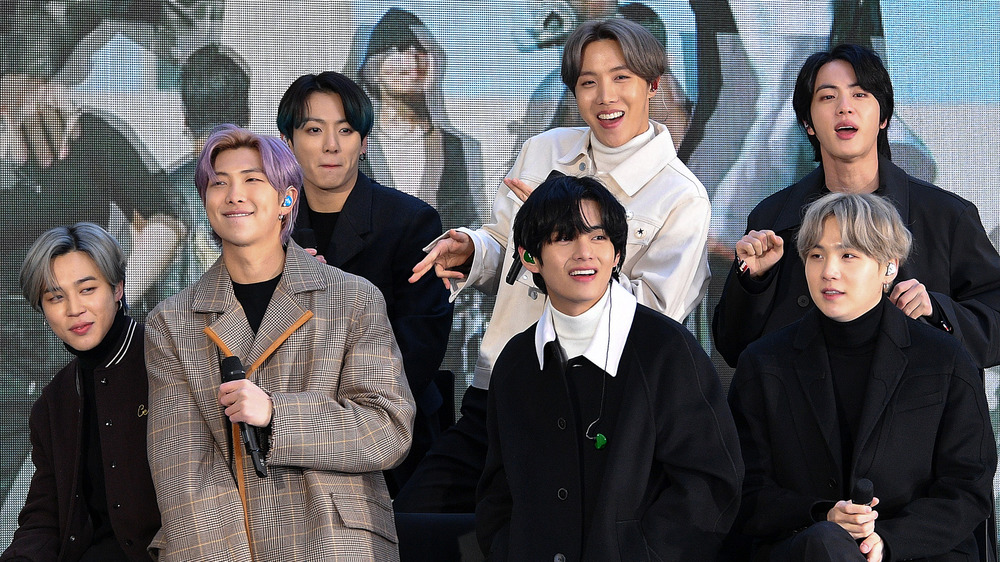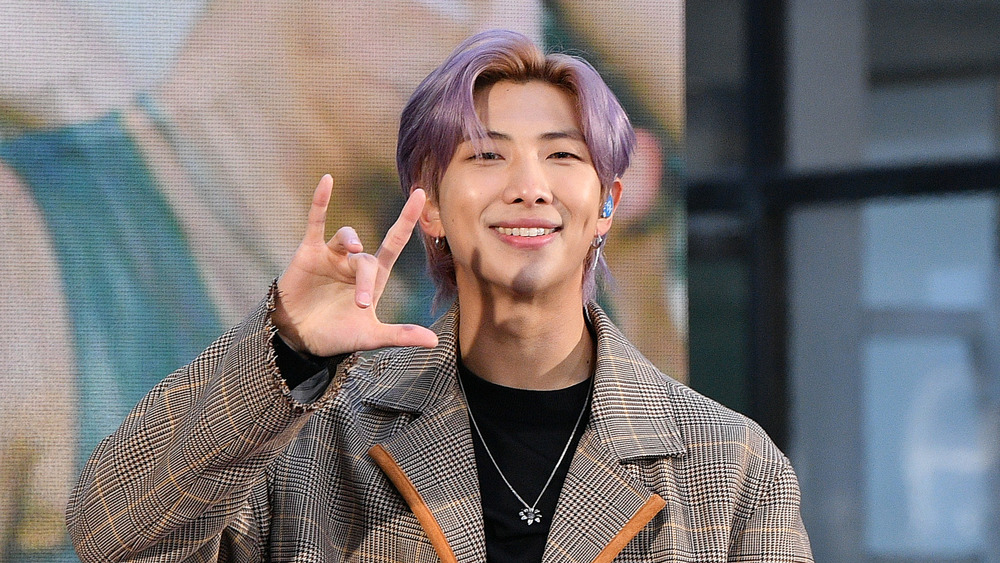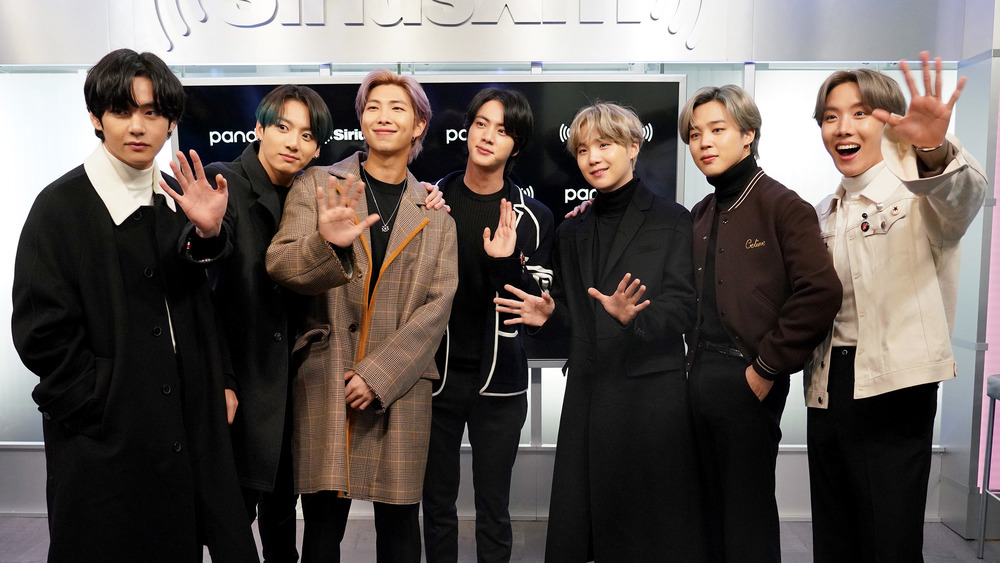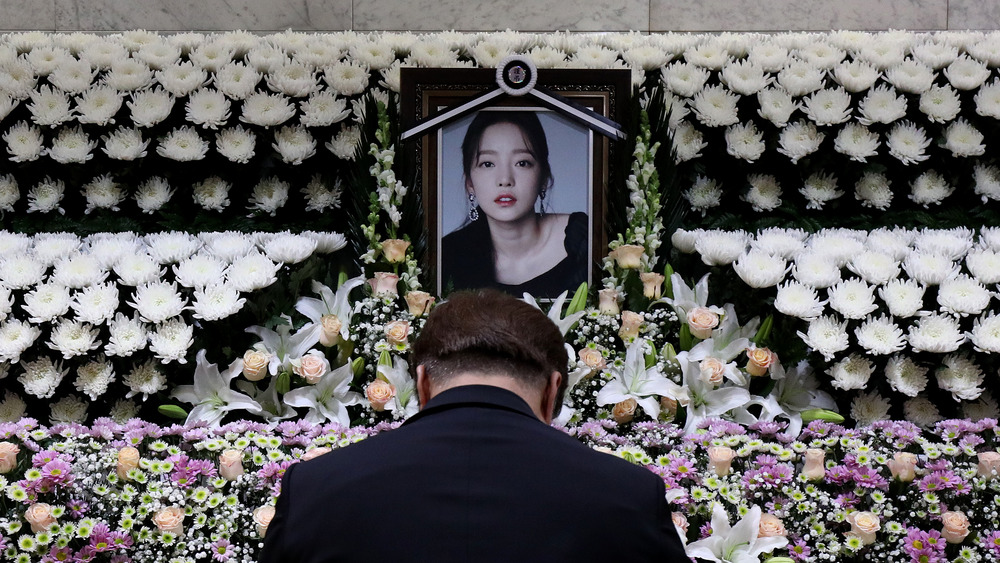BTS Reveals The Truth About Their Love Lives
When it comes to the K-pop industry, it's been well reported over the years that South Korea's pop music machine places an undue, sometimes brutal amount of burden on trainees who have dreams of fame and fortune. The fact that would-be K-pop idols willingly enter into contracts with management companies and record labels that are colloquially nicknamed "slave contracts" greatly hints at the agency and autonomy they sacrifice for the sake of a successful career in the entertainment industry.
Since the growing international recognition of K-pop acts like BTS and Blackpink have boosted the South Korean music industry's profile worldwide, numerous media outlets, like Insider, have churned out investigative deep-dives as to what the dark side of the K-pop music mill entails, including stories of grueling, non-stop 20-hour work days, dangerous food restricting, no-contact provisions for friends and family, and more, according to K-pop idol Grazy Grace. The fact that many of these stipulations are usually only lifted, slowly but surely, after K-pop idols achieve success within the industry — most often marked by an official "debut" as a star, which is mandated by the star's label and/or management team — doesn't make it any easier.
These outlets have also zeroed in on one particular restriction for wannabe K-pop stars: dating. It's a point that Esquire profiler Dave Holmes made sure to include in a recent feature for the magazine's December 2020 issue about the music phenom BTS. So what's the band's love life like?
RM says BTS' first love is the fans
When asked about the status of any romantic relationship — if at all — the seven members of BTS may or may not have in a December 2020 Esquire profile on the band, the group's resident rapper RM was quick to dissuade anyone of the notion that he, alongside bandmates Jin, Suga, Jungkook, V, Jimin, and J-Hope, have any form of an active love life to speak of. Instead, he emphasized that their number one priority is with their label, Big Hit Entertainment.
"Our company [Big Hit] started with 20 to 30 people, but now we have a company with so many employees," RM explained. "We have our fans, and we have our music. So we have a lot of things that we have to be responsible for, to safeguard. I think that's what an adult is."
Speaking more directly about the possibility of BTS' romantic relationships — or, more specifically, quashing rumors of the kind in the first place — RM then reiterated that the band's first love is the BTS Army, the nickname given to their fanbase. "Our love life — twenty-four hours, seven days a week—is with all the ARMYs all over the world," RM added.
BTS' lack of a love life is much bigger than the band
Based on RM's comments about the lack of any romantic relationships for the band, the fact that it is indeed the case is overall unsurprising for anyone with even a cursory sense of how K-pop an industry — and the stars who work to uphold it — works.
As the South China Morning Post noted in a November 2020 breakdown of the rules and restrictions that are widely placed upon K-pop idols and trainees, the prohibition against dating in any form also extends into an exhaustive list of restrictions that do their best to segregate male and female would-be stars, including allegedly barring them against having meals scheduled for the same time to prevent co-mingling and heavily forbidding access to personal cell phones. Part of this has to do with the immense pressure placed on trainees to succeed in their career of choice and to do so with as little distractions as possible — but part of it also has to do with Korean fan culture and that a possible relationship could anger a contingent of a band's fanbase.
While there have certainly been cases in the past of K-pop idols being able to circumvent the largely imposed three-year-dating ban — flouting these rules have also had an immensely negative impact on the lives of some idols out of that handful.
K-pop's industry restrictions can have tragic consequences
Out of these more tragically-inclined cases are stories like that of former girl group Kara member Goo Hara, who purportedly completed suicide in November 2019 after experiencing a series of relentless Internet harassment campaigns. As outlets like the BBC reported, many of her online attackers focused on the way in which she flouted K-pop's dating restrictions, as well as an ongoing lawsuit in which her ex-boyfriend threatened to expose a video of the two that was allegedly sexual in nature. News of her death came only weeks after the apparent suicide of Goo's best friend and K-pop idol Sulli, who received similar treatment from online detractors.
As the Los Angeles Times noted, dating restrictions can be tied to larger issues, specifically for female idols, who are typically more drastically affected by them than their male counterparts. While objectification by fans might play a huge part in relation to these restrictions, the ramifications of these restrictions also make it difficult for followers to see their idols as human beings capable of imperfection. In turn, the provisions placed upon idols can lead to feelings of alienation.
"[Idols are] not given the opportunity to formulate their own identities," Seoul National University of Science and Technology scholar Lee Jong-im told the Times. "Because they're at the center of intense attention from the public, they're never given the time to recover from and overcome emotional pain."
If you or someone you know is having suicidal thoughts, please call the National Suicide Prevention Lifeline at 1-800-273-TALK (8255) or text HOME to the Crisis Text Line at 741741.




